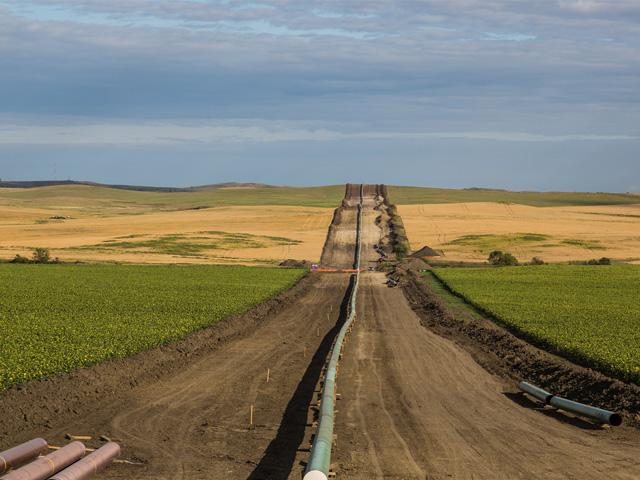Dakota Access Fights Potential Closure
Tribes Along Pipeline Tell Court Closure Would Harm Their Oil Business
LINCOLN, Neb. (DTN) -- Dakota Access LLC continues to fight to keep its pipeline open, arguing in federal court in Washington, D.C., this week that permanent closure would be devastating to area Native American tribes that sell oil.
The company is waging a legal fight on two fronts after losing its federal easement.
Dakota Access filed a reply to a Standing Rock Sioux Tribe motion for a permanent injunction on Monday in the U.S. District Court for the District of Columbia. In addition, on April 12, the company requested a motion for an en banc hearing before the entire U.S. Court of Appeals for the District of Columbia Circuit. An en banc hearing is a hearing before all judges in a circuit.
On Monday, Dakota Access asked the district court to reject a request for permanent injunction against the pipeline.
Three affiliated tribes including the Mandan, Hidatsa and Arikara Nation filed a declaration with the court opposing the pipeline shutdown. One such declaration comes from MHA Nation Chairman Mike Fox.
"Chairman Fox explains that 'If the Dakota Access pipeline is shut down, the MHA Nation will suffer significant financial, environmental and safety harms that will add further injury to the MHA Nation's economy already suffering monumental losses as a result of the COVID-19 pandemic,'" the company said in its court filing, "including losses 'exceeding $160 million over a one-year period' and five additional fatalities on their roads annually."
Dakota Access said the tribes rely on the pipeline to transport more than 60% of their oil production.
"That oil production is critical to the MHA Nation, whose oil and gas reserves on its Fort Berthold Indian Reservation account for fully 25% of North Dakota's oil production," the company told the district court.
Agriculture groups have told the courts a permanent shutdown of the pipeline would have devastating consequences for farmers, who would face increasing grain transport congestion as a result of more oil being transported by rail.
P[L1] D[0x0] M[300x250] OOP[F] ADUNIT[] T[]
EN BANC HEARING
Back in January, the D.C. Circuit court ruled Dakota Access violated the law by conducting work on the pipeline without an easement, https://www.dtnpf.com/….
Last week, Dakota Access asked the appeals court for an en banc hearing, arguing the U.S. Army Corps of Engineers had conducted an environmental review, although the court ruled otherwise.
"In this case, the U.S. Army Corps of Engineers complied with NEPA (National Environmental Policy Act)," the company argued in its petition.
"It thoroughly reviewed the environmental effects of granting an easement to install a 1.73-mile segment of the Dakota Access Pipeline deep beneath Lake Oahe in North Dakota. Taking into account DAPL's state-of-the-art design and response plans, the Corps determined that the likelihood of a large spill into Lake Oahe was 'extremely low.' Indeed, data from the Pipeline and Hazardous Materials Safety Administration show that the probability of a spill into Lake Oahe larger than what the Corps extensively modeled is once in almost 200,000 years. NEPA accordingly allowed the Corps to prepare an environmental assessment and finding of no significant impact, rather than an environmental impact statement."
The Dakota Access pipeline was constructed underneath Lake Oahe, which was created when the Corps flooded thousands of acres of Sioux lands in the Dakotas by constructing the Oahe Dam on the Missouri River.
The lake provides several successor tribes of the Great Sioux Nation with water for drinking, industry, and sacred cultural practices. According to the Mineral Leasing Act, the pipeline could not traverse the federally owned land at the Oahe crossing site without an easement from the Corps.
In January, the appeals court ruled the pipeline could continue to operate while the Corps conducted a review.
STATES INVOLVEMENT
In December 2020, 14 states alleged in a brief that the closing of the pipeline could hurt agricultural economies in the Midwest because of expected cost increases to ship grain.
In an amicus brief filed with the court, the states of Indiana, Montana, Iowa, Kansas, Kentucky, Louisiana, Missouri, Nebraska, Ohio, South Carolina, South Dakota, Utah, West Virginia and Wyoming sided with agriculture interests, the pipeline company and the Corps of Engineers.
If agriculture has to compete for railway and truck service, the brief said, agriculture will face "intractable railroad congestion, rotting grain, higher food prices, and ultimately, a potential for food shortages."
Also filing separate amicus briefs were the North Dakota Water Users Association, Western Dakota Energy Association, the state of North Dakota, North Dakota Farm Bureau, North Dakota Grain Dealers Association, North Dakota Grain Growers Association, South Dakota Grain Growers Association, South Dakota Farm Bureau Federation, South Dakota Grain and Feed Association and the South Dakota Soybean Association.
The groups are concerned closing the pipeline could drastically increase the costs of transporting commodities. According to the groups, railroads transport 72% to 82% of North Dakota's crop output.
From April 2016 to February 2017, Native American and other groups protested the construction of the pipeline running from the Bakken oil fields in western North Dakota and crossing the Missouri and Mississippi rivers to southern Illinois.
Part of the pipeline runs near the Standing Rock Indian Reservation. Protests centered on concerns about the pipeline's effect on water supplies used for irrigation, drinking water and threats to ancient burial grounds.
The appeals court ruled the Corps violated environmental law in 2017 when it allowed the pipeline owner, Energy Transfer, to build beneath South Dakota Lake Oahe.
Read more coverage here: https://www.dtnpf.com/….
Todd Neeley can be reached at todd.neeley@dtn.com
Follow him on Twitter @toddneeleyDTN
(c) Copyright 2021 DTN, LLC. All rights reserved.




